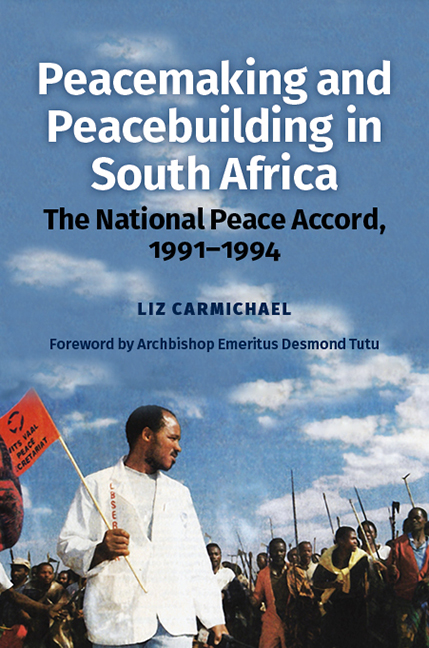Book contents
- Frontmatter
- Dedication
- Contents
- List of Illustrations
- List of Abbreviations
- Glossary
- Acknowledgements
- Note on Nomenclature
- Transition Timeline
- Foreword
- Introduction
- Part One Peacemaking, Peacebuilding, and the South African Conflict
- Part Two Peacemaking
- Part Three Peacebuilding
- Conclusion: Impact and Unfinished Business
- Bibliography
- Index
9 - Negotiating the National Peace Accord: The Agreements
Published online by Cambridge University Press: 08 October 2022
- Frontmatter
- Dedication
- Contents
- List of Illustrations
- List of Abbreviations
- Glossary
- Acknowledgements
- Note on Nomenclature
- Transition Timeline
- Foreword
- Introduction
- Part One Peacemaking, Peacebuilding, and the South African Conflict
- Part Two Peacemaking
- Part Three Peacebuilding
- Conclusion: Impact and Unfinished Business
- Bibliography
- Index
Summary
Introduction
This chapter gives an overview of the Accord's development, then focuses on each of the negotiated chapters: the political Code of Conduct, a Code and provisions for the security forces, socio-economic reconstruction and development, and the peace structures.
Roelf Meyer, lead government negotiator for both the Accord and constitutional negotiations, hails this experience as the real beginning of multiparty talks. It was a ‘collective effort’ of politicians, business and civil society ‘all working together in finding an answer to the problem’. The process was planned together, the experience was mostly one of consensus, ‘and it resulted three months later in the signing of the Accord, which was a major success’. The facilitators all had ‘day jobs’ so meetings began late afternoon and ‘we worked like hell in those three months, day and night’:
It was our real first experience of negotiations together. Prior to that, you know, we were talking to each other but no real negotiations. … what I’m saying is that was the first real, successful, experience in negotiations by all concerned in South Africa. And that was why to my mind … it was a major achievement.
Fanie van der Merwe, looking at a copy of the NPA, concurs: ‘What was achieved at Codesa, was already achieved here. … it's an amazing document, that one.’
Constructing the Accord
Negotiations began in the Working Groups on 11 July. The WGs submitted first drafts to the Process Group by 2 August, to be collated by a Compilation Com- mittee brilliantly led by Fanie van der Merwe and Theuns Eloff. Compilation began on the evening of 7 August in Attie du Plessis's Sandton office.
Preambles and principles from each Group were extracted and became the Accord's Preamble and its first chapter, ‘Principles’. Language and terminology were harmonized. By noon on 8 August the first ‘Draft National Peace Accord’ was ready for referral to the parties. It went to Mandela, Ramaphosa and the ANC's NEC; to de Klerk, his Cabinet and SSC; to Buthelezi, who took it to King Zwelithini, the IFP Central Committee, and KwaZulu Legislature; and to the Auditor General for budgeting. Feedback was incorporated.
- Type
- Chapter
- Information
- Peacemaking and Peacebuilding in South AfricaThe National Peace Accord, 1991-1994, pp. 144 - 165Publisher: Boydell & BrewerPrint publication year: 2022



